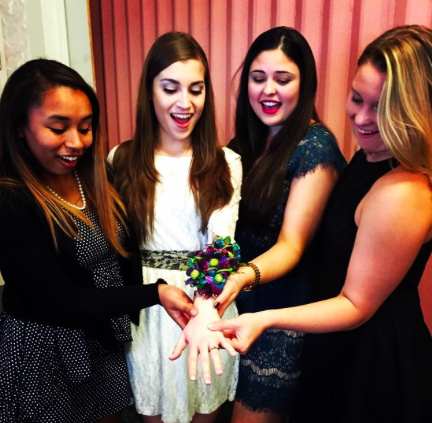Going for the Gold: The Indirect Competition & Aggression Between Women for the Ring

Ladies, I am sure many of you have had a day where your hair, makeup, and outfit on point. I am also sure that, on that day, you can’t help but notice all the dirty looks coming from most, if not all of the other women in the room. You become a threat and, as disturbing as it seems, you become sexually objectified. I have witnessed various times a beautiful woman walk into the room and other women gang up on her like a pack of wolves claiming that “she must be a whore” or that “he’s definitely not with her for her mind.” This is the result of cultural suppression and double standards which indirectly causes women to not only create an indirect competition and aggression for men but for the ring. Witnessing, as well as experiencing, this indirect competition and aggression piqued my interest, which made me question why women spend more time putting down other women instead of empowering one another.
While researching this matter, I came across articles that took me aback by claiming that “women can’t help themselves” since it’s encoded in our genes. Dr. Tracy Vaillancourt is part of the McMaster University Psychology department in Canada. She lead a research study that indicated that the reason women are so “bitchy” and intolerant of one another is due to intrasexual competition initiated by evolution. I am not even joking. “Bitchy” is indicated as one of the tags to the scientific article that is published on Pub Med.
She claims that it’s inevitable that women see their own gender as a threat to their men, therefore creating an aggressive competition between other women because females have greater parental investment than males. This study was “proven” by using couples and seeing which type of woman the girlfriend would feel more comfortable introducing to her boyfriend. The two options were one, the conservatively dressed woman or two, the provocatively dressed woman. The results of the experiment in which most women chose the conservatively dressed woman “indicated” that the girlfriends felt threatened and aggression towards the provocatively woman due to her image of promoting sexual availability. This also leads us to believe that the girlfriends felt the need to prevent any possibility of potential competition so that they do not lose their opportunity to marry their boyfriends.
John Archer published an article intended to support Dr. Vaillancourt’s hypothesis which compared female and male aggressions and connecting it back to evolution. However, the study indicated that there is not much difference between both sexes in regards to aggression. Females do have a slight increase in indirect aggression compared to males in early childhood but by the time they reached adulthood there was no difference between sexes.
Yes, I do agree that women can be vicious and yes, sometimes an aggressive competition is created, however it is not because of our “female genes” but due to the likelihood of social expectations and the patriarchal belief that women must compete against one another for the validation of men, beauty and status.
Brigham Young University supported my theory by leading a study which indicated that purposeful manipulation that harm others may be associated with social prominence and can begin as early as ages 4 and 5 years of age. Yes, you read that correctly, little girls in kindergarten are competing against their peers by criticizing, lying, and manipulating facts. This is done just for the title of “queen bee” and over the years it has gotten worse. You would assume parents would nip this inexcusable behavior in the bud. However, certain parents actually encourage this “mean girl” behavior because it validates their daughter’s status as the popular girl in class, not the social pariah.
Many women are surprised by these statistics but how can they be? This type of social concept and expectation is being taught through various TV shows, films, books, and music at a much younger age than in previous years. This is due to the modernization of technology. Essentially, we have invested millions of dollars to anti-bullying campaigns yet we are also promoting that it’s a “normal” trait to be hateful. This aggression soon transforms to not only having the “it girl” status but the need of wanting the validation of men.
In one of my favorite Ted Talks titled “We Should All Be Feminists” lead by writer and lecturer Chimamanda Ngozi Adichie touches upon the subject of the aggressive competition between women. She states that:
“We raise girls to see each other as competitors. Not for jobs or for accomplishments, which I think can be a good thing. But for the attention of men. We teach girls that they cannot be sexual beings in the way that boys are. Feminist: the person who believes in the social, political and economic equality of the sexes.”
I obviously agree with her statement. I myself have had personal experience in interacting with women who made great efforts to make me feel inferior. This is because we are raised to believe that our worth and focus should be based on the validation of men instead of our success. Indirect aggression in today’s age is a lot more cutthroat and manipulating due to the modernization of technology on cellphones, tablets, and computers. Instead of just innocuous gossip, some women are now deciding to use social media such as Twitter, Facebook, and Instagram to antagonize, manifest their insecurities, and criticize peers.
Now, I am not saying that all competition is abhorrent because it does motivate us to perform our best whether it be in sports, academics, or work. However, the competition can become hateful, which causes us to feel an unnecessary competition and aggression amongst our own gender for a higher status, validation of beauty, or the need for a wedding ring from a man. Then, that is when there is an issue and it is time that we reflect on our aggressions and learn from our mistakes to prevent future women from feeling the need to compete.
We need to stop raising girls to compete with each other for a wedding ring and start raising women who empower one another.




